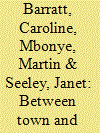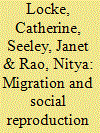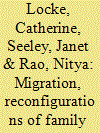|
|
|
Sort Order |
|
|
|
Items / Page
|
|
|
|
|
|
|
| Srl | Item |
| 1 |
ID:
113176


|
|
|
|
|
| Publication |
2012.
|
| Summary/Abstract |
In Uganda, as in many other African countries, increasing numbers of 15-24 year olds are migrating to urban areas to look for work and educational opportunities. We explore the shifting sense of identity amongst youth migrants in Uganda as they struggle to reconcile the differences in social norms between the rural settings in which they are brought up and the urban environment in which they now live. The experience of migration significantly impacts on the transition from youths to adults by influencing their perception of their own identity as well as the expectations of society. Young people often hold conflicting views of their rural and urban experiences, suggesting that understanding rural and urban realities as distinct entities does not reflect the complex relationship, and possible confusion, of the migrant experience. In contrast to existing literature on migrant identities, which has tended to focus on the identity shift experienced by adult transnational migrants, this reveals the particular challenges faced by youth migrants whose adult self is not yet formed.
|
|
|
|
|
|
|
|
|
|
|
|
|
|
|
|
| 2 |
ID:
080123


|
|
|
|
|
| Publication |
2007.
|
| Summary/Abstract |
Over the last decade evidence has emerged suggesting that in many countries fisherfolk, as an occupational group, are at greater risk to HIV and AIDS than the general adult population. This high vulnerability has been explained in terms of the lifestyles associated with fishing and related occupations, such as fish processing and trading. Fishermen have been portrayed as risk takers, their attitudes and behaviour shaped by the physical and economic risks of the fishing lifestyle. Women in fishing communities, often engaged in fish processing and trading and providing food and lodging in fishing settlements, are portrayed as being in subordinate social and economic positions and prey to sexual exploitation by cash-rich fishermen. There is a danger in such lifestyle summaries that fisherfolk are characterized as feckless risk takers with a reckless attitude to the chance of contracting HIV. In this article we look at the lives of some men, women, and children living in a lake-side community in Uganda severely affected by HIV and AIDS to illustrate how existing portrayals of fisherfolk, and fishing communities, need to avoid stereotypes in order to better inform appropriate health sector and livelihood support measures
|
|
|
|
|
|
|
|
|
|
|
|
|
|
|
|
| 3 |
ID:
126107


|
|
|
|
|
| Publication |
2013.
|
| Summary/Abstract |
This review paper focuses on low-income migrants in (or from) developing countries and their social reproduction, and asks what this means for their social protection. We focus on the recognition that migration involves (re)negotiations of social reproduction by migrants and their families. These renegotiations are heavily inflected with gendered power relations in ways that are specific to individual and family life course. As such, migration involves taking on new risks and dynamic vulnerabilities in sustaining everyday and intergenerational social reproduction. These are sharpened by the increasing feminisation of migration flows and obstructed by wider changes in social provisioning and exclusionary citizenship regimes. The resulting social protection challenges unfold over lifetimes, and are especially marked at critical periods of transition. Life-course thinking has the potential to theoretically integrate emerging insights from rich empirical studies; doing this supports the rationale for revaluing the importance of social reproduction within debates about migration and social protection.
|
|
|
|
|
|
|
|
|
|
|
|
|
|
|
|
| 4 |
ID:
126106


|
|
|
|
|
| Publication |
2013.
|
| Summary/Abstract |
This introduction reviews the contributions this collection of articles makes to understanding migration, social reproduction and social protection. Migration necessarily involves reconfigurations of family relations and these entail changes in the patterning of social (in)security. Our expansive interpretation of the concepts of social reproduction and social protection situate the reorganisation of gendered family lives as integral to the migration-development nexus. Life-course thinking informs analysis of how migrants 'do family' and what this means for gender, identity and (in)security. The collection explores how 'care deficits' are managed, both discursively through the negotiation of gendered ideologies about gender identity and the family, and through the everyday practice of social reproduction. The resulting reorganisation of social security involves taking on new risks and vulnerabilities for migrants and their families. For both internal and international migrants the challenges involved in securing social reproduction are powerfully shaped by welfare and migratory regimes and raise important questions about the relationship between social protection and broader social policy and citizenship issues.
|
|
|
|
|
|
|
|
|
|
|
|
|
|
|
|
|
|
|
|
|